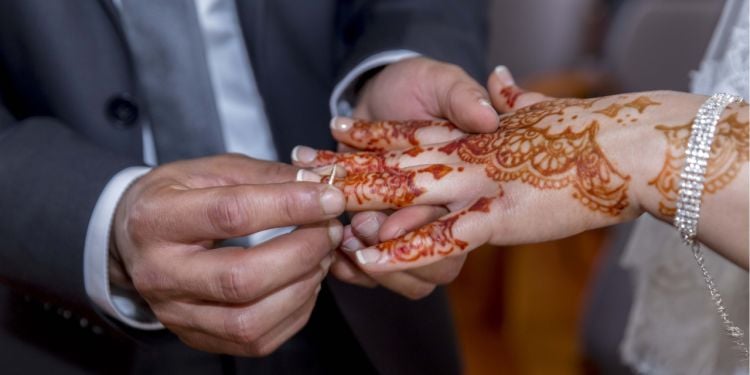
If you dream of getting married in the United Arab Emirates, Expat.com provides practical information that you need to know before you can tie the knot.
It is not difficult to get married in the United Arab Emirates. However, there are certain requirements that you need to meet in order to be eligible for marriage. These requirements may differ depending on the circumstances, but there are a few that are standard under the United Arab Emirates' law. So before you get started on the exciting part of planning a wedding party, find out more about the legal paperwork that needs to be completed to obtain your marriage license.
Premarital requirements in the UAE
In order for any marriage to take place in the UAE, the following standard requirements must be met and provided:
- The bride must approve of the marriage;
- If the marriage is taking place in Dubai, at least one person (the groom, bride, or the bride's guardian) must have a valid residence visa in the UAE;
- If the marriage is taking place in other emirates, both the bride and groom must have a valid residence visa in the UAE;
- A positive premarital screening certificate can be obtained from specific healthcare facilities across the UAE.
Premarital counseling and screening in the UAE
All residents wishing to get married in the UAE must undergo a premarital examination. This medical screening aims to protect the health of both the bride and groom from potential infections that could be transmitted between them. Couples who opt for a civil marriage are not required to go through this premarital screening process.
The examination tests for the following:
- HIV;
- Hepatitis B;
- Hepatitis C;
- Syphilis;
- Genetic diseases such as beta-thalassemia;
- Sickle cell anemia;
- Rubella;
- Blood type (grouping).
Blood types are checked as a precaution for the couple, as some blood groups are not compatible with each other and could lead to complications during pregnancy.
You should be aware that the marriage may be denied by the UAE courts if the results of this examination come back negative, indicating that one or both parties may have a genetically inherited blood disease or a transferable disease.
You will need to book an appointment in order to get the screening, and it can be done through one of the healthcare facilities listed on the following websites:
- Abu Dhabi - Ambulatory Healthcare Services;
- Dubai - Dubai Health Authority;
- Ajman - Government of Ajman.
Marrying an Emirati man in the UAE
If your significant other happens to be an Emirati man, there are a few things you need to keep in mind with regard to the marriage process.
If your future spouse is a member of the Armed Forces, an employee of the Ministry of Foreign Affairs, or a member of the police force, he will need special permission from his employer to marry an expatriate woman.
It should be noted that if he is a UAE national from Ajman, he will also need to obtain approval from the Sharia Court of Ajman (Islamic court) if he wishes to marry a woman who is not a Gulf Cooperation Council (GCC) citizen (e.g., a citizen of Bahrain, Kuwait, Oman, Qatar, or Saudi Arabia).
Marrying an Emirati woman in the UAE
If you are an expat who wants to marry an Emirati woman, there are a few more requirements that need to be met. For starters, the bride will also need to request special permission from her employer if she is a member of the Armed Forces.
In addition to this, she will need to have the consent of her parents or legal guardian in order for the marriage to proceed.
There are also requirements that the groom must meet for the marriage to take place:
- He must hold a valid citizenship and must not be stateless;
- He must be a UAE resident;
- He must obtain a certificate of good conduct issued from the UAE (police clearance certificate);
- He must belong to the Muslim faith or must convert to Islam.
It is also worth mentioning that the bride should not have gotten her UAE nationality by dependency. This means that she should not have become a citizen through a previous marriage to an Emirati man.
Civil marriage in the UAE
Civil marriage was introduced in Abu Dhabi in December 2021 and later throughout the country as of February 2023. It is aimed at streamlining and facilitating the process for non-Muslim expats to get married in UAE courts.
As it stands, civil marriages can be conducted in either Abu Dhabi or Dubai.
Civil marriage in Abu Dhabi
If you're a tourist or visitor in the UAE and are looking to get married, you're in luck! Civil marriage procedures in Abu Dhabi do not require either party to be a UAE resident and are open to everyone. Unlike some of the other marriage options in the UAE, women who want to have a civil marriage do not need their parents' or guardian's approval, and the couple are not required to undergo the premarital medical screening.
To be eligible for a civil marriage in Abu Dhabi, both the bride and groom must be non-Muslim or citizens of a non-Muslim country. They cannot be under the age of 18 and should both be consensual of the marriage. A declaration form will need to be signed in front of a judge, which states that neither person is currently married to anyone else.
You will need to have the following documentation prepared for your civil marriage:
- A marriage application form, completed and signed;
- A copy of both parties' passports of Emirates IDs;
- Proof of no existing marriage for both the bride and the groom (which can be obtained from your country's consulate).
You can apply for your civil marriage in Abu Dhabi online or in person by visiting the Family Court building in Zayed Sports City.
Civil marriage in Dubai
Dubai residents who are in a rush to get married can make use of the emirate's civil marriage process, which allows you to obtain a wedding license in just 24 hours. Unlike Abu Dhabi, this service is currently only available to expats specifically residing in Dubai.
The couple must both be non-Muslim, and at least one person must be a Dubai resident to proceed. The required age is higher than Abu Dhabi, as both parties must be aged 21 or older. Original IDs need to be presented, along with proof of no existing marriage (which can be obtained from your country's consulate).
You can apply for your civil marriage in Dubai online.
Marriage between Muslim expats in the UAE
Islamic marriages taking place in the United Arab Emirates will be performed under the provisions of Sharia law. This means that either the bride and groom have to be Muslims, or the groom is Muslim and marrying someone from another religion. You will also have to find two male witnesses who have to be present at the wedding ceremony.
Women should get the consent of their father, their brother, or their uncle to get married. In the absence of these, the nearest man who presents himself as the woman's guardian can give his consent. However, his presence is not compulsory in the Sharia court during the wedding. You will simply need a statement of his consent. In the absence of a guardian, the ecclesiastic Sheikh can also assume this role.
If the woman is a Muslim but her father is not, she will need to obtain a “No Objection” letter from her embassy or consulate. Additionally, if the woman is divorced or widowed, she must provide proof of this status in order to proceed with the marriage.
The legal age of marriage is 18 Hijri years (about 17 years old). If either of the couple is younger, the judge's approval will be required. The difference in age should also not be so vast that one spouse's age is double that of the other; otherwise, the spouse will also require the judge's approval before proceeding.
You can find out your Hijri age (Islamic calendar) online through this tool.
Once the marriage contract has been signed and completed, it must be registered in a Sharia court in the UAE.
Marriage between non-Muslim expats in the UAE
When it comes to expats of other religions or those who don't follow any religious doctrine, the marriage can be performed at a temple, church, or at the couple's residence. It is also possible to get married at your embassy or consulate within the UAE. If you do get married at a church in the UAE, both you and your partner have to be Christians.
In the case of some countries, spouses have to register at their embassy or consulate in the United Arab Emirates at least 2 months before the scheduled wedding date. Once a non-objection certificate has been issued, you will be allowed to get married within the 10 following days. Thereafter, you will have to register your marriage certificate.
Generally, the laws of your home country would be applicable to your marriage in the UAE. However, it is always recommended to check back with your consulate or a legal expert in Family Law before proceeding, as there may be other rules and regulations specific to your nationality or religion.
Marriage between a non-Muslim man and a Muslim woman in the UAE
If the love of your life is a woman who belongs to the Muslim faith, but you do not, it is important to note that a marriage cannot be conducted in the UAE unless you convert to Islam.
This requirement follows Sharia law, and proof of conversion must be provided before proceeding with the marriage.
Converting to a different faith is a life-changing decision, but if it is something you are willing to do for love, you can visit one of the following websites for more information on the process:
Marriage in the UAE for GCC citizens
Citizens of the GCC who wish to get married in the UAE may do so under the same process of Muslim marriages under Sharia law.
However, it is important to note that citizens of Saudi Arabia, Bahrain, and Kuwait who wish to marry someone of a different nationality, regardless of whether they are a man or a woman, must obtain approval from their respective countries' governments. This approval can be applied for through their countries' consulates in the UAE but may take up to 2 months to acquire.
Same-sex marriage in the UAE
While the UAE is taking leaps of advancement in terms of adapting its laws to accommodate its growing population of expats, homosexuality is still not legally openly permitted. This means that same-sex couples wishing to get married are unable to do so in the UAE.
The process of getting married in the UAE is ever-evolving, and changes are constantly being introduced to make the process even easier for expats. Some of the future plans to come into effect are the ability to apply for marriage certificates online, as well as sign official wedding documents over video conference.
It is advisable to monitor the UAE government's website for updates on this and other changes that may be enforced with regard to marriage in the UAE.
Good to know:
- You will probably be called for an interview by the Civil Status Department of the embassy in order to verify the authenticity of your wedding.
- Unmarried couples living together are frowned upon by Emirati society. This can be considered adultery, although a new law has been passed to legalize the cohabitation of non-Muslim couples regardless of their marital status.
- The term “Sharia” means Islamic law. It is a set of doctrinal, social, cultural, and relational norms. Often used in the religious context, it means "the way to enforce the law of God".
- Emiratis are encouraged to marry Emiratis as a way to build and preserve the Emirati family. This is done by offering financial support and grants to Emirati couples.
Useful links:
We do our best to provide accurate and up to date information. However, if you have noticed any inaccuracies in this article, please let us know in the comments section below.












Comments
1